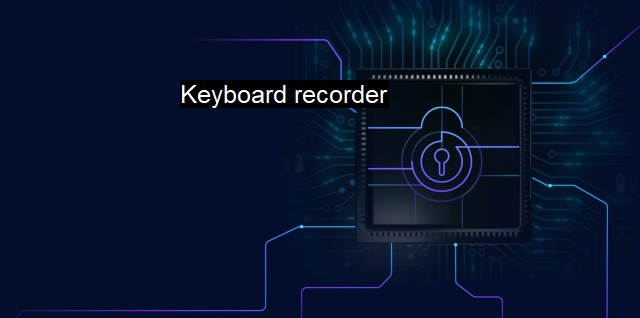What is Keyboard recorder?
Cybersecurity in the Digital Era: Protecting Against Keylogger Attacks and Choosing the Best Anti-Keylogging Solutions
A keyboard recorder, also known as a keylogger, is a type of system surveillance software or technology that is primarily designed to capture and record all keystrokes on a keyboard. This means all the messages, appointments, web searches, and passwords entered by the keyboard are logged and stored. Though some keyboard recorders can have benign applications, they also hold immense potential for misuse and consequently, they pose a significant concern in the realm of cybersecurity and antivirus protection.a keyboard recorder operates by tracking and capturing each keyboard action input by a user, whether it’s letters, numbers, or function keys, and then storing that data in a digital file or transmitting it to a third party. The information gathered can range from general application usage to highly sensitive personal and financial details.
From a cybersecurity viewpoint, keyboard recorders are predominantly linked to malicious purposes. Cyber attackers can surreptitiously install this feature on the victim's computer without their consent or knowledge. Once installed, the keyboard recorder can passively record every keystroke a user makes, allowing the attackers to acquire sensitive information like usernames, passwords, credit card information, and other confidential data.
Keyboard recorders used maliciously are a potent tool of cyber attackers leading to many cybersecurity vulnerabilities. When deployed as part of a larger strategy, keyboard recorders can populate a range of harmful programs from malware, adware, trojans, to advanced persistent threats (APTs). Cyber attackers who deploy such methods make extensive use of keyboard recorders as a form of spyware to access, steal, and manipulate sensitive information. These keyboard recorders can also evade professional antivirus software, making them all the more perilous.
Keyboard recorders are not inherently malicious. Some legitimate uses of keyboard recorders include administrative user tracking, parental controls, and accessibility features for disabled users. Corporations might use keyboard recording tools to monitor employee productivity, track hours worked, or monitor compliance with computer use policies. with the increase in complex cyber threats today, the potential misuse of keyboard recorders often overshadows their benign applications.
Just as sword can be wielded for both protection and harm, so too can a keyboard recorder be used alternately for good, or abused as a means of cyber theft and exploitation. This dichotomy underscores the crucial role of holistic cybersecurity solutions which encompass both robust antivirus programs and expansive network security protocols that focus not just on safeguarding against known threats but also incorporating proactive threat hunting to identify and neutralize unprecedented perils.
Antivirus software serves as the first line of defense against keyboard recorders. It scans regarding an individual device for harmful files and remove them, while network security involves securing a larger network infrastructure from invaders that antivirus software might not identify. Procuring potent and regularly updated virus signatures and leveraging innovative and modern techniques like artificial intelligence and machine learning algorithms for threat hunting can significantly enhance cybersecurity measures against keyboard recorders and their ilk.
Enhancing knowledge about keyboard recorders' action and common safeguarding measures can go a long way in bolstering keyboard recorder security. This comprises of practicing safe web browsing and email habits, frequently updating software, and running regular system checkups.
Indeed, the pernicious potential of keyboard recorders necessitates continuous vigilance and proactive action from both developers and users alike. Even as technology advances and augments our lives in myriad ways, it also perpetually mounts fresh challenges for cybersecurity. Keeping abreast of threats like the keyboard recorder then, is less an elective avocation and more a critical cornerstone of modern digital life.

Keyboard recorder FAQs
What is a keyboard recorder?
A keyboard recorder, also known as a keystroke logger, is a type of software or hardware device that records every keystroke made on a keyboard. This includes usernames, passwords, and sensitive information that can be used for malicious activities.How does a keyboard recorder work?
A keyboard recorder works by capturing every keystroke entered by the user. It can be installed as software on a computer or as a hardware device between the keyboard and the computer. Once installed, it runs silently in the background, recording every keystroke made on the keyboard.Why is a keyboard recorder a security threat?
A keyboard recorder is a security threat because it can capture sensitive information, such as passwords, credit card numbers, and personal data, which can be used for malicious activities. Hackers and cybercriminals can use keyboard recorders to steal confidential data and compromise the security of networks and systems.How can I protect myself from keyboard recorders?
To protect yourself from keyboard recorders, you should install a reliable antivirus software that includes anti-keylogging features. You can also use a virtual keyboard or a password manager that encrypts your keystrokes and passwords. It's also important to avoid downloading and installing software from untrusted sources and to keep your operating system and software up-to-date.| | A | | | B | | | C | | | D | | | E | | | F | | | G | | | H | | | I | | | J | | | K | | | L | | | M | |
| | N | | | O | | | P | | | Q | | | R | | | S | | | T | | | U | | | V | | | W | | | X | | | Y | | | Z | |
| | 1 | | | 2 | | | 3 | | | 4 | | | 7 | | | 8 | | |||||||